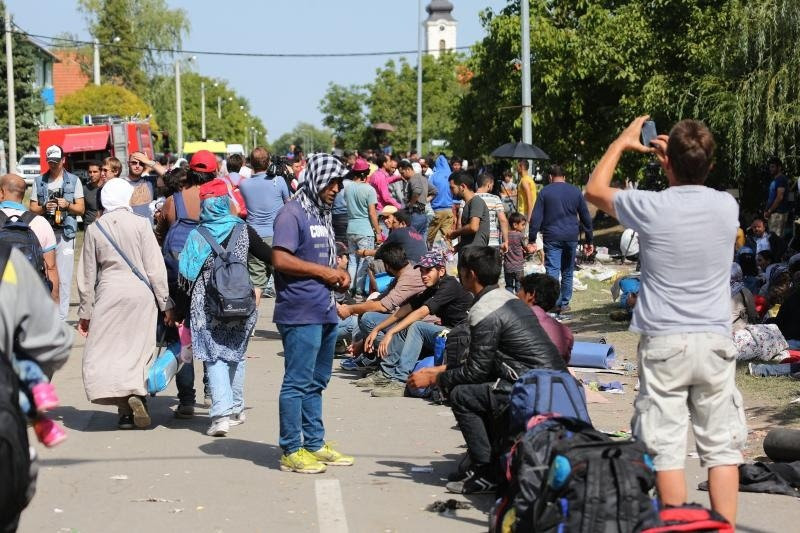
Refugees stream into Croatia
Saturday 19 September 2015
Photo: Marko Mrkonjic/Pixsell
According to Croatian HRT TV news, Saturday 19 September evening edition, 21 000 refugees have entered Croatia from Serbia since Wednesday. The refugees, often referred to as the migrants, mostly from poor or war-torn countries in the Middle East, Africa and Asia, have streamed into Croatia since Wednesday, after Hungary blocked what had been the main route with a metal and razor-wire fence and riot police at its border with Serbia. Serbian authorities had then steered them and assisted them to Croatia’s borders and after Croatia closed its border with Serbia during the week, the refugees found alternative routes: they walked into Croatia through forests, corn and farm fields.
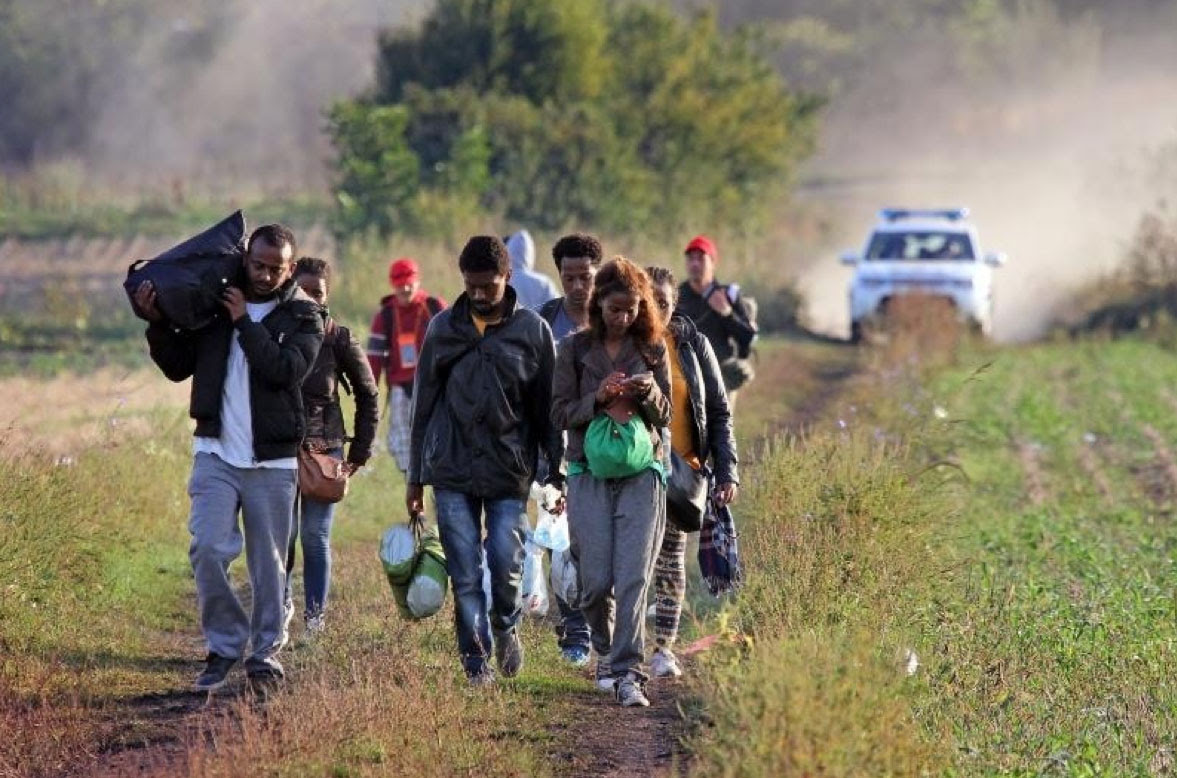
Crossing the border to Croatia
across farms and cornfields
Croatia's prime minister, Zoran Milanovic wants to redirect the refugees flowing into his country to Hungary and Slovenia. He says Croatia can no longer receive refugees. However, the Hungarian government has, during the past couple of days, raised a barbed-wire fence along some 41 kilometer land border between it and Croatia (the rest of the border is a river) to keep the refugees out. Croatia has already transferred to the Hungarian border some 4,000 refugees and a couple of thousand to the Slovenian border. Both Hungary and Slovenia are resisting receiving the refugees and keep pounding vitriolic comments against Croatia.
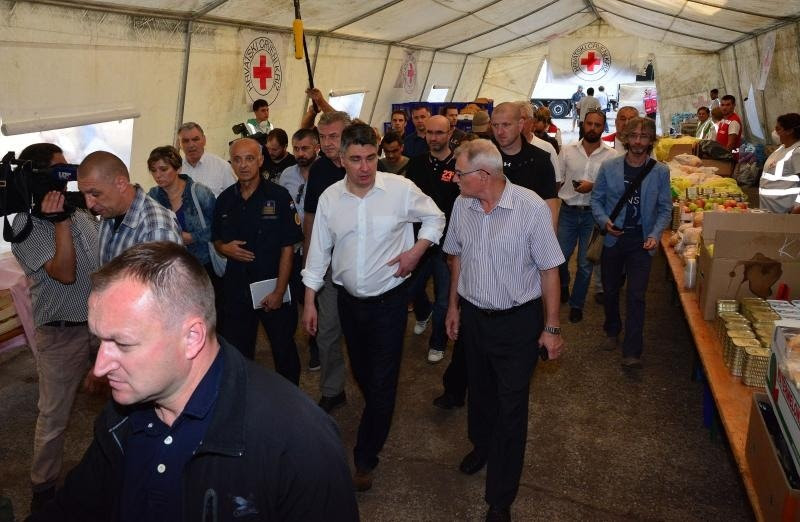
Croatian Prime Minister
Zoran Milanoviuc inspects
a refugee food and first aid tent
After suddenly finding itself in the path of Europe's biggest tide of migrants for decades, Croatia said on Friday it could no longer offer them refuge and would wave them on, challenging the EU to find a policy to receive them. "We cannot register and accommodate these people any longer," Croatian Prime Minister Zoran Milanovic told a news conference in the capital Zagreb. "They will get food, water and medical help, and then they can move on. The European Union must know that Croatia will not become a migrant 'hotspot'. We have hearts, but we also have heads." The arrival of 21,000 since Wednesday morning, many crossing fields and some dodging police, has proved too much for Croatia. It cannot sustain the burden economically or facilities wise. The refugee crisis has left the EU scrambling for an effective response. Hungary has begun threatening Croatia that it will not recommend it becomes a Schengen area member state since it cannot contain its borders or offer aid to the influx of refugees. This criticism regarding humanitarianism comes from a country that just built 4-meter fences along its borders and chased off the refugees with tear gas and other types of violence!

Police assist refugees in Croatia
With tempers clearly fraying, anything could happen in EU. Croatian Prime Minister Zoran Milanovic on Friday 18 September talked on the telephone with German Chancellor Angela Merkel and the two agreed that the problem of the current migrant wave had to be solved on the EU’s external borders. Such a scenario is actually alarming given that the refugees clearly do not want to remain at EU’s external borders - Greece, Bulgaria, Hungary, Croatia, Italy…so one wonders what Merkel and Milanovic meant by solving the problem on the EU’s external borders? Would force need to be used?

Refugees in Tovarnik, Croatia
waiting in line for food
Italy and Greece say they cannot cope with migrants coming by sea who, under the EU's Dublin system, should be given shelter and potentially asylum in the first EU state they enter. Germany, France and other northern states complain Italy and Greece are ignoring the Dublin rules on registering asylum-seekers and helping them travel north through the Schengen area. They now complain Italy and Greece are slow to accept EU help to properly register migrants and send back non-refugees, meaning many can drift across Europe working without documents. Hungary blames Greece for the tens of thousands arriving there this summer and has now fenced off its border with Serbia and its new target to throw blame against is Croatia! Slovenia has also entered the blame and rejection game. It too, like Hungary says it will protect the Schengen borders! Greece and Italy are within the Schengen area also but have not protected the borders and, instead, moved the refugees onward into Europe – let someone else worry about them, would sum it up.
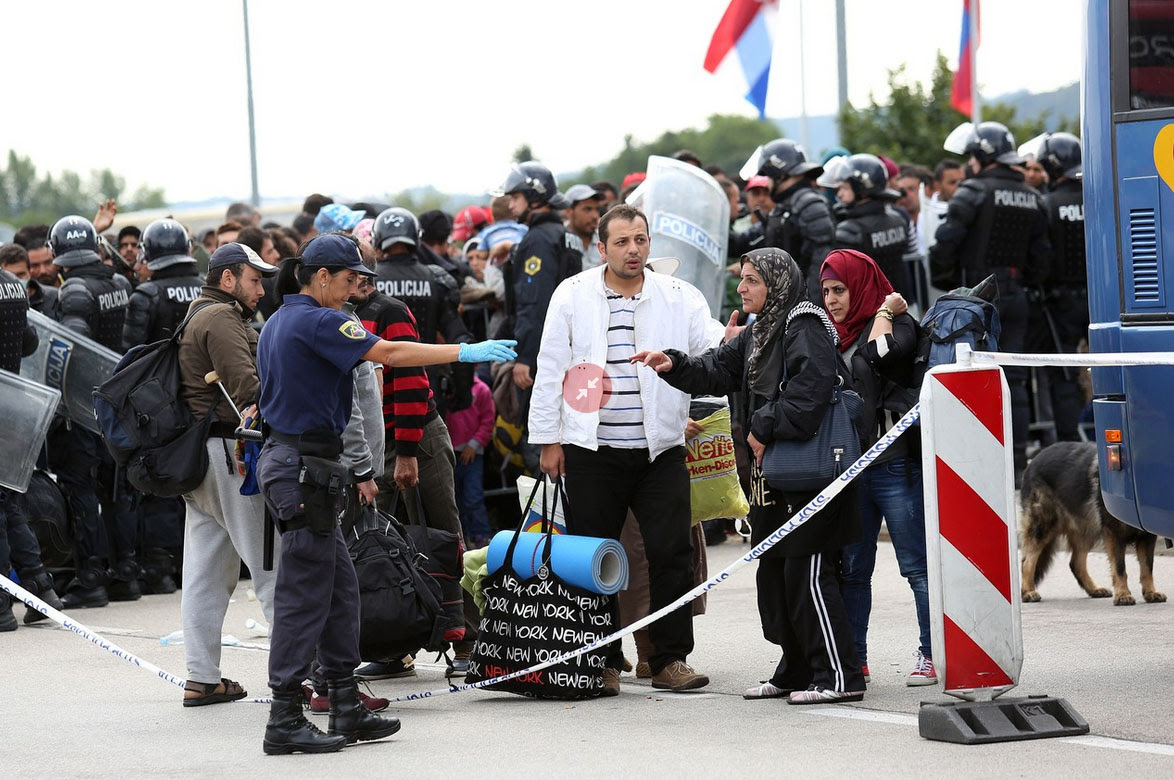
Assisting refugees onto buses
in Croatia
Saturday 19 September 2015
Germany, France and others criticise eastern states led by Slovakia, the Czech Republic and Hungary for blocking a larger Jean Claude Juncker plan to relocate 120,000 according to quotas. Some say these ex-Communist states lack solidarity after years of receiving EU subsidies and could be penalised by having their grants cut. These eastern European countries accuse Germany of bullying, say relocation will only draw in more immigrants who will, in any case, not want to stay in eastern Europe but will defy the unenforceable Dublin rules and cross Schengen borders to Germany. They say that the EU bailed out Greece on a number of occasions and yet it does not seem to be getting the harsh criticism from Brussels as they are. Obviously EU isn’t going to change its composition of egotistical states any time soon.Stung by criticism of "Brussels" for not being able to quieten the squabbles between member states affected by the refugee crisis, European Commission officials have noted that their power is limited. Variations in the welcome given to refugees or benefits offered are national prerogatives.

Croatia and
refugee crisis in EU
An EU emergency response system to provide extra frontier guards has been canvassed in Brussels but such a mechanism can only be triggered by invitation - something Athens, caught up in debt crisis and new elections, has yet to issue, reports Reuters.Comforted by a strong vote on Thursday 17 September for its mandatory quota proposal in the European Parliament, another federalist institution, the European Commission declared this "a clear signal to ... ministers ... that it is high time to act and finally agree". But national leaders insist on first seeking consensus among states. "I feel an allergy to coercion," their summit’s chairman Donald Tusk, a former Polish prime minister, said last week. Juncker last week suggested a common EU border guard service and some officials believe a single EU asylum system could make better sense than a patchwork of national policies.
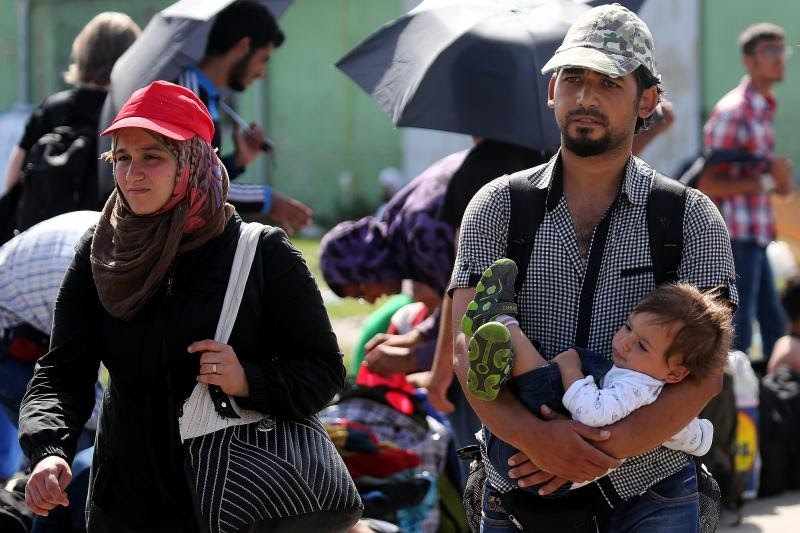
Syrian refugees (or migrants?) in Croatia
Now, one cannot throw caution to the wind and not ponder on the unwanted eventuality of EU setting up large refugee camps in Croatia as part of the solution, given that Croatia is outside the Schengen area. Could that possibility be in what Milanovic and Merkel reportedly agreed upon? That the problem needs to be solved on EU’s external borders! Could Croatia end up being a huge camp in which the refugees are housed until processed, until their refugee status confirmed or rejected and from where they would either be distributed to other EU countries or deported out of EU? Large numbers are in question. It’s estimated that besides the 500,000 that have already entered European Union countries, another 500,000 are expected the coming year. Having in mind points of entry one can estimate that about 200,000 will enter through Greece and then up to Croatia/Hungary. Such overwhelming numbers would have alarming and destructive effects on the culture and life in Croatia as we know it with large doses of security issues to breeding of radicalism and terrorism as has been observed in other EU countries where multiculturalism has been developing for decades.

Kolinda Grabar-Kitarovic
President Of Croatia
Photo: Ivo Cagalj/Pixsell
Croatia’s Vecernji List reports that president Kolinda Grabar-Kitarovic had Saturday 19 September spoken to the UN Secretary General Ban Ki-moon and several state leaders about the migration crisis. She emphasised that the problem of the crisis is not only Croatian but also European and global and that it needs to be solved according to those premises. She said that Croatia would insist on solving the problem as being a global one as opposed to a local one. She expects that some 40,000 refugees will enter Croatia in the coming two days and that measures of security and other matters must be put in place in order to secure stability. “Croatia is not a country of first entry, Serbia is qualified as a safe country and therefore there is no need for thousands of migrants to cross over daily to Croatia, we cannot absorb them. We must, first of all, be realistic, secure safety of our own citizens and the stability of our country. We must know who the people crossing our borders are, that it be under supervision, at official crossings, not illegally, then we need to know where they are going because we cannot take care of so many on a long term basis,” she said. Now all Croatia needs is a consensus between the Prime Minister Zoran Milanovic and President Kolinda Grabar-Kitarovic regarding the safety and security but the likelihood of that happening to an ideal level is quite slim with general elections “around the corner”. I do so agree with President Grabar-Kitarovic that the problem is global and the UN must start playing a bigger role. That particularly with view to establishing more refugee camps outside the EU countries, including Serbia if they reach it from Turkey/Greece. Ina Vukic, Prof. (Zgb); B.A., M.A.Ps. (Syd)









Nema komentara:
Objavi komentar